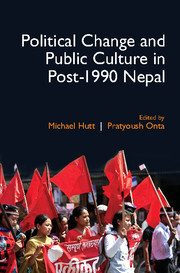Book contents
- Frontmatter
- Contents
- List of Figures
- Introduction Political Change and Public Culture in Post-1990 Nepal
- Part I Rumour
- 1 The Royal Palace Massacre, Rumours and the Print Media in Nepal
- 2 The Royal Palace Massacre, Conspiracy Theories and Nepali Street Literature
- 3 Country of Rumours: Making Sense of a Bollywood Controversy
- Part II Ethnicity and Identity
- Part III Activist Cultures
- Part IV Gender and Resistance
- Part V Heritage
- Contributors
- Index
3 - Country of Rumours: Making Sense of a Bollywood Controversy
from Part I - Rumour
Published online by Cambridge University Press: 23 July 2017
- Frontmatter
- Contents
- List of Figures
- Introduction Political Change and Public Culture in Post-1990 Nepal
- Part I Rumour
- 1 The Royal Palace Massacre, Rumours and the Print Media in Nepal
- 2 The Royal Palace Massacre, Conspiracy Theories and Nepali Street Literature
- 3 Country of Rumours: Making Sense of a Bollywood Controversy
- Part II Ethnicity and Identity
- Part III Activist Cultures
- Part IV Gender and Resistance
- Part V Heritage
- Contributors
- Index
Summary
'A country where music competition judges
are deaf people sporting earphones
…
… this is a country of hearsay and rumour
If one were to unearth the foundation of each house here
only hearsay and rumour would be found heaped there’
While Nepal's popular movement for multiparty democracy in 1990 triggered processes of grassroots level party-building (Hachhethu, 2002) and a liberalization of markets (Shakya, 2013), the following two decades saw the rise of a polarizing discourse on ethnic and regional identities – a situation comparable to that which took place in the neighbouring countries during independence from colonization and for rather similar reasons. In this chapter, I trace one aspect of identity politics in Nepal through an ethnography of street riots and shop floor protests instigated by hill Nepalis against the Madhesis from the Nepal-India border. These riots were triggered by rumours of a remark on Nepal allegedly made by a famous Bollywood star, while a post-riot series of events involving political parties and media brought underlying tensions between the two sections of the population to the surface. Rumour is the primary category of analysis in this ethnography. I argue that rumours not only embody and reproduce issues of public contention, but also re-articulate objective accounts through individuals’ negotiations of their own surroundings. It is not just that the existence of rumours was central to the way in which militant public outbursts erupted in December 2000; rumours routinely renegotiated and redefined the meanings of public events spanning half a century when Nepal shifted from pro-monarchy Panchayat regime to multiparty democracy and then to a republic.
At the heart of hill Nepalis’ scepticism about their Madhesi compatriots is the latter's ethnic and cultural proximity to the people of the Indian flatlands. There are no clear criteria for dealing with the alleged ‘Indianness’ of Madhesis while accepting them as equal Nepali nationals within a multicultural polity. It certainly did not help that the three decades of Panchayat rule under King Mahendra, which claimed to ‘modernize and develop’ Nepal, had in reality continued and even deepened the hegemonic institutionalization of the high caste Pahadi (hill) way of life as ‘Nepali’ (Burghart, 1984).
- Type
- Chapter
- Information
- Political Change and Public Culture in Post-1990 Nepal , pp. 56 - 74Publisher: Cambridge University PressPrint publication year: 2016



